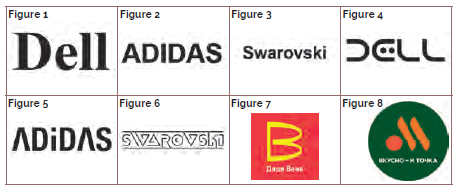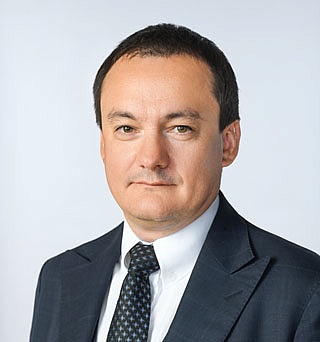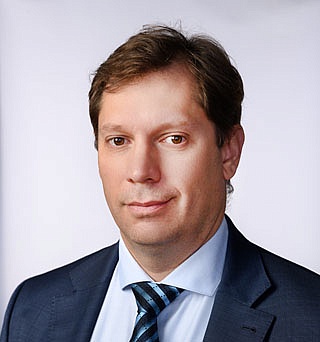Back up your brand: dealing with new threats for trademarks in Russia
11 September 2024
Following the current political situation and the sanctions imposed on Russia, some Western companies decided to re-consider their trading and other business activities in Russia, and in some cases, announced total termination, winding down, or suspension of business in Russia starting from 2022. Taking advantage of the moment, some market players, acting in bad faith, are attempting to register famous brands or their imitations in their own name without the consent of the real owners of those brands. In some cases, bad faith applications are filed for mirror imitation, such as Figure 1 (Appl. №2022746075, now refused), Figure 2 (Appl. №2022723177, now withdrawn), and Figure 3 (Appl. №2022724293, now withdrawn).

In others, applications are filed for the creative imitation of famous brands featuring high levels of stylization such as Figure 4 (Appl. №2022720003, now refused), Figure 5, (Appl. №2022719552, now refused), and Figure 6 (Appl. №2022720127, now refused).
Bad faith applications are normally filed without the consent of the true owner and are usually rejected because they are associated with famous brands.
Over the last two years hundreds of applications have been filed by local persons to register different imitations of famous brands. The mere fact of filing an application does not guarantee that the mark will get registered. The point is that the Russian PTO conducts examinations on both absolute and relative grounds and, in particular, is supposed to refuse applications if these are filed for marks that are confusingly similar to the prior third parties’ marks existing on the Register in respect of similar goods. Therefore, in most cases, obvious copycats of famous marks are rejected during examination based on similarity grounds as well as for being misleading as to the commercial origin of goods. In some cases, bad faith applicants make up their minds to voluntarily withdraw their applications, such as in the case with McDonald’s, where the Russian company specializing in the production of canned vegetables initially filed an application to register “Uncle Vanya” copycat Figure 7 and then decided to give up the application. In some cases, the local business comes up with a better idea of re-branding: it launches replacement brands that are fairly distinct from the original brands to eliminate confusion. For example, instead of McDonald’s, a new local brand, Figure 8, which could be translated as “Tasty and that’s it” was born to replace the original one.
The existence of prior rights in confusingly similar signs should pose an obstacle to the acceptance and registration of third parties’ bad faith applications featuring imitations of true owners’ brands.
However, the prior right should be valid to be cited against a bad faith application, and trademark squatters, in some cases, initiate non-use cancellation actions against cited trademarks in order to remove obstacles and get their own registration.
To retain validity, a trademark must be used in Russia in accordance with the adopted use requirements. In particular, in Russia, a trademark becomes vulnerable to cancellation for nonuse three years after the registration date. This means that after the expiration of this grace period, any interested third party is entitled to file a cancellation action against trademark registration on the grounds of non-use. It may be assumed that for those brands who left the Russian market in 2022, the three-year period of continuous nonuse expires very soon – in 2025.
The non-use cancellation action starts with a pre-trial letter in which the interested person suggests that the brand owner should either voluntarily assign its brand to the plaintiff or renounce its trademark. If no reply is received within two months, the interested person may initiate a non-use cancellation action before the IP Court which shall institute legal proceedings if all formal requirements are met. At that, the legal interest in pursuing the cancellation action has to be documentarily proved.
The burden of proof lies with the defendant (brand owner) in the cancellation proceedings. That means that the cancellation action can be based on mere presumption that the mark has not been used in Russia for the last three years and it is up to the trademark owner to prove otherwise in order to retain the registration in force and defeat the cancellation action.
According to the Russian use requirements, a trademark is considered as having been used if it has been used by the brand owner themself, their recorded licensee, or any other person under the brand owner’s control. In case the branded goods enter the Russian market using parallel (grey) import channels, the brand owner may not be able to control how its brand is used in Russia, and such use may be deemed improper and not being in compliance with use requirements.
In this regard, it should be noted that the Russian Ministry of Industry and Trade issued Order No. 2701 in March 2022, legalizing the import of certain goods into Russia without the owner’s consent (also known as the “List of goods allowed for parallel import,” or “the List”) in an effort to prevent a shortage of goods made by foreign manufacturers in response to the termination of business by some foreign brands on the Russian it clear that this process entails the import of authentic products via alternative supply routes rather than the authorization of counterfeit goods.
The list of brands that are eligible for parallel import includes dozens of different products, including cars and spare parts, electronics and household appliances, clothing and shoes, cosmetics, furniture, paper and cardboard, industrial equipment and materials, and may be changed depending on the decision of the brand owners to remain or resume trading in Russia. If the brand owner wishes for its trademark or product to be excluded from the List, it is necessary to confirm that the brand owner has decided to remain on the Russian market, and suppliers of imported products will maintain their logistics and supply products to the Russian market.
Although the use of a trademark is obligatory, Russian law provides for some circumstances which may be treated as excusable reasons for non-use. These are circumstances that are beyond the control of a trademark owner, such as forcemajeure circumstances, personal health of a trademark owner, and unpredicted political decisions. These circumstances may be used as a defense to defeat the cancellation action.
However, the Russian authorities are unlikely to accept an excuse for non-use if the trademark use was suspended because the owner voluntarily withdrew from the Russian market. The same applies to the sanctions imposed on Russia by some of the foreign states – the mere reference to such sanctions should not be deemed a good reason for non-use and may not be used as a defense in the non-use cancellation proceedings because there is no local law prohibiting theforeign trademark owner from using its trademark in Russia.
Therefore it would be strongly recommendable to ensure that the documents attesting to the use of the brand(s) in Russia by the brand owner themselves, or any other person under its control for registered goods and services for the previous three years are accessible and prepared for examination by the relevant authority and any interested party in the event that the cancellation action is brought.
Non-usage of a trademark could put this trademark at serious risk of being attacked by squatters, who are now very active. They are attempting to revoke the protection of globally recognized brands whose owners do not utilize them in Russia by filing cancellation actions for non-use so as to pave the way for their bad faith applications for identical or confusingly similar marks to proceed to acceptance without being provisionally refused based on similarity grounds.
To be on the safe side, in the event that the current registration is not properly used in Russia and could be removed from the Register for non-use, and to stop a potential third party’s application for a similar mark from being accepted on the grounds of similarity, it makes sense to consider filing new back-up application(s) if the business has, in fact, ceased trading activities on the Russian market. However, it should be kept in mind that the so-called “double” registration is prohibited in Russia; therefore, it will be prudent and worthwhile in the circumstances to consider re-filing for a trademark that wouldbe slightly different from the registered trademark or for the same mark covering an amended list of goods/services to avoid the duplication issue.
It should be noted that there are no obstacles for foreign companies to continue filing applications for any registrable IP subject-matter, including patents, trademarks, designs, and other since Russia is a member-state to many International Treaties in the IP sphere and equally protects the IP rights of domestic and foreign companies.
The present article gives just a general idea of how IP-related issues related to the current political situation in the world could be resolved to better safeguard brand owners’ interests in Russia. However, each particular case requires a specific legal approach, and brand protection strategy development should take into consideration best practices and IP solutions.











